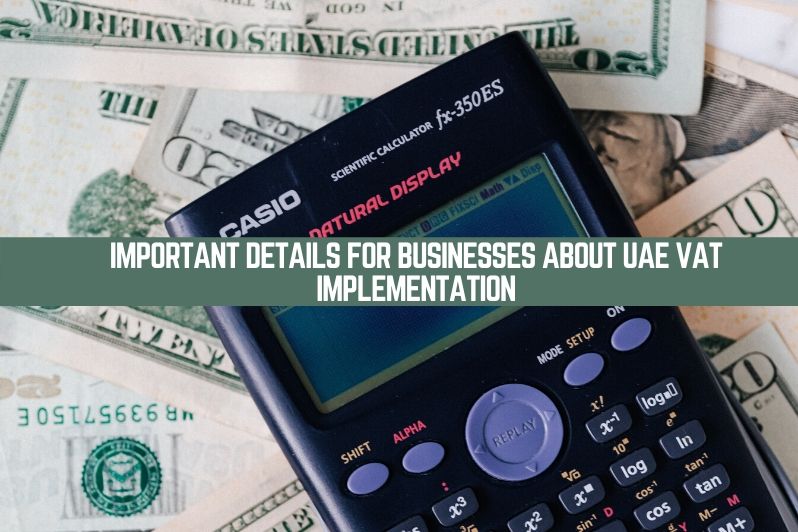From January 1 2018, VAT or Value Added Tax are applied to all relevant transactions in each level of the supply chain in United Arab Emirates. Regardless of where it is that you operate in the world, VAT implementation in a business is never a task that’s easy. There’re likely several different implications, which is why we have thought of providing small businesses in UAE a guide for the new taxation. Read on as we’ve also analyzed the effects of tax in the country!
Should All Businesses be Registered for VAT in UAE?
Companies with annual supplies turnover of more than Dhs 375,000 and are operating in UAE are to register for VAT under mandatory VAT registration UAE. Companies that have annual supplies turnover of less than Dhs 375,000 but more than Dhs 187,500 may register for VAT under voluntary VAT registration UAE.
Take note: VAT is applicable on all tax registered businesses that are managed in any of the fifty free zones of the UAE and in UAE mainland. But, if the tax authorities define certain free zones as UAE designated zones, then they are to be treated as not applicable for VAT purposes. A transfer of supplies between two different designated ones is considered as VAT-free.
UAE VAT Return Filing
By the end of every VAT period, a VAT registered business, also known as a taxable person, is required to submit to the Federal Tax Authority UAE a VAT return. VAT returns are summaries of value of purchases of a VAT-registered business, as well as its supplies, which have been made during a certain tax or VAT period. A VAT return in UAE shows the VAT liability of the VAT-registered person.
A VAT return may be filed quarterly or monthly with the help of a regulated tax agent in Dubai. Although VAT returns are the ones to be presented to tax authorities, documents and records related to the transactions involving VAT are to be kept. Documents include payroll records, fixed assets, inventory statements, wages, records, profit and loss (P&L) accounts, and balance sheet.
A taxable business entity has to perform VAT return filing in UAE with the tax authority regularly or within twenty eight days from the end of a certain tax period that is defined for every kind of business that is operated in the UAE. Tax periods are specific periods of time in which tax that is payable to the FTA is calculated and paid to the taxation authority. Standard tax periods are as follows: monthly for businesses that have Dhs 150 million as annual turnover (can be more) or quarterly for VAT-registered businesses that have annual turnover of under Dhs 150 million.
VAT Liability
VAT liability is the difference of output tax payable which is the tax that is charged for the supply of a good or service in a certain tax period with the input tax which is the acquired VAT from purchases of the business that’s recoverable by the business on the same exact taxation period.
Where the amount of input tax is lower than the output tax of a VAT-registered business, the difference has to paid to the tax authority. Where the output tax is lesser than the amount of input tax, the VAT-registered business has excess input VAT which can be recovered. The VAT-registered business can use this in setting off subsequent payments that are due to the UAE tax authority, the FTA.
Is it Possible for Tourists to get Refunds for VAT Paid on Expenses?
A tourist that is visiting the UAE may get VAT back that he or she has paid. The VAT refund can be claimed 24 hours before leaving the UAE. However, you should remember that a tourist is required in paying fifteen percent as administrative fee and 4.8 percent tag fee with each individual claim for VAT refund.
A tourist that is visiting UAE who’s 18 or older is eligible for a VAT refund in UAE. A visitor that intends in leaving the UAE together with the goods that were purchased has to leave the country a day before the VAT is refunded.
What is the Most Significant Impact of VAT in UAE?
In UAE and majority of Gulf states, oil prices have been cut in half. This means nations’ revenue has also been halved. The problem lies in the expenditures not coming down. Oil dependent nationals are accruing debt at fast rates. Measures have been taken in balancing the budget, and that includes the implementation of VAT, including in the UAE and KSA.
In the UAE, local authorities say price inflation is minimal for the country because key goods are used by most people remain not applicable to VAT and government closely monitors prices during the entire implementation of VAT in UAE.
Do you want further clarification? Call us here in VAT Registration UAE!

